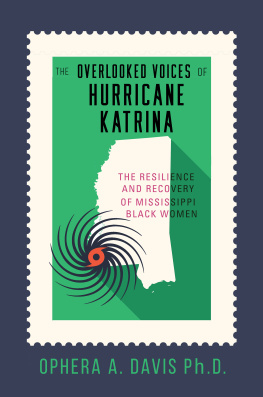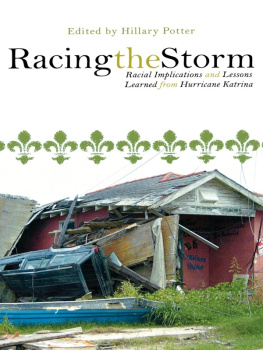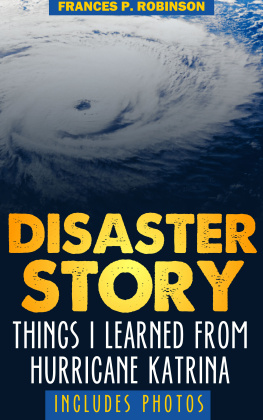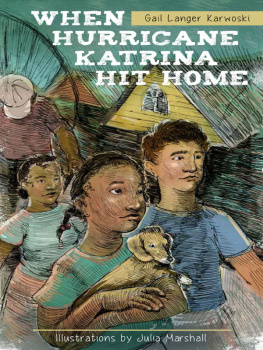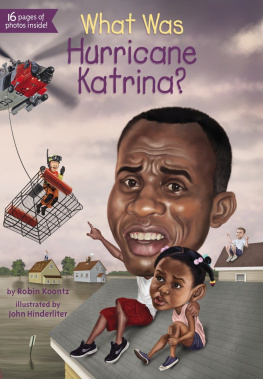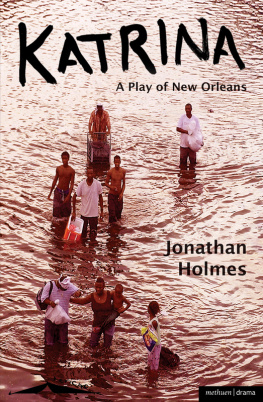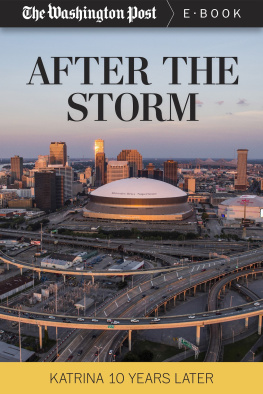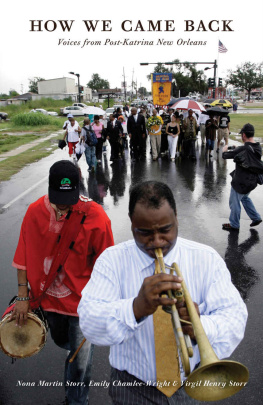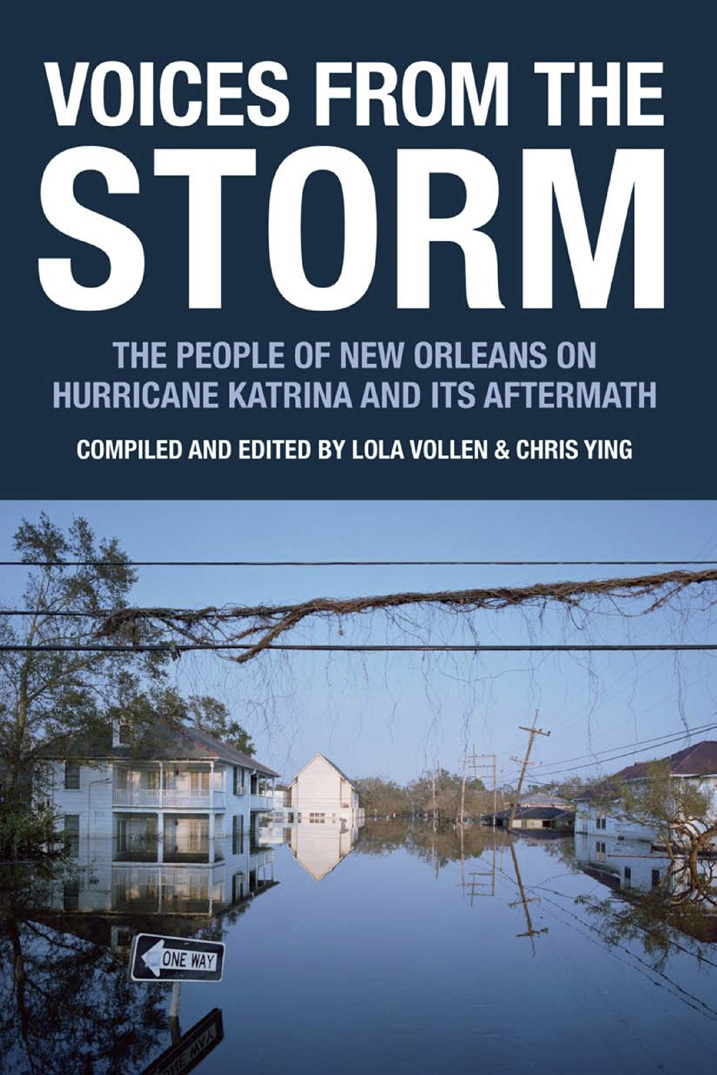VOICES FROM THE STORM

For more information about McSweeneys, see mcsweeneys.net
For more information about Voice of Witness, see voiceofwitness.org
Copyright 2008 McSweeneys
Cover photos by Aric Mayer
All rights reserved, including right of reproduction in whole or part in any form.
McSweeneys and colophon are registered trademarks of McSweeneys Publishing.
Second Edition
ISBN (E-book): 978-1-940450-92-6

VOICE OF WITNESS

The Voice of Witness series allows those most affected by contemporary social injustice to speak for themselves. Using oral history as a foundation, the series illustrates human rights crises through the stories of the men and women who experience them. These books are designed for readers of all levelsfrom high school and college students to policymakersinterested in a reality-based understanding of ongoing injustices in the United States and around the world. Visit voiceofwitness.org for more information.
VOICE OF WITNESS BOARD OF ADVISORS

ROGER COHN
Former Editor-in-Chief, Mother Jones
MARK DANNER
Author, professor, UC Berkeley Graduate School of Journalism
HARRY KREISLER
Executive Director, Institute of International Studies, UC Berkeley
MARTHA MINOW
Professor of Law, Harvard Law School
SAMANTHA POWER
Professor, Kennedy School of Government, Harvard University
JOHN PRENDERGAST
Senior Advisor, International Crisis Group
ORVILLE SCHELL
Director, Center on U.S.-China Relations, Asia Society
STUDS TERKEL
Author, oral historian
WILLIAM T. VOLLMANN
Author
The editors would like to thank the men and women of New Orleans who participated in this project. In the wake of tragedy, they donated valuable time and energy to tell us their stories. The editors would also like to thank Stacy Parker Aab, Colin Dabkowski, Kalamu Ya Salaam, and Billy Sothern for their assistance in producing this book.
GENERAL ASSISTANCE: Noa Bar, Momo Chang, Miles Clark, Earl Downing, Kelly Dunleavy, Eric Falcao, Jim Fingal, Susan Fridy, Courtney Jones, Amanda Hurtado, Rachel Khong, Patrick Knowles, Steven Leckart, Julie Limbaugh, Matt Mengarelli, Julia Meuse, Jared Moore, Angela Petrella, Bernice Santiago, Brian Short, Tavia Stewart, John Thayer, Rebecca Turnbull, Todd von Ammon, Michael Patrick Welch, Andy Werner, Jami Witek. COPY EDITOR: Darren Reidy. OTHER: Eli Horowitz, Andrew Leland, Jordan Bass. RESEARCH: Dave Levin, Sam Weiss, Dan Sanders. MANAGING EDITOR: Chris Ying. SERIES EDITORS: Dave Eggers, Lola Vollen.
CONTENTS
Guide
by Lola Vollen and Chris Ying
Voices from the Storm tells the story of thirteen New Orleans residents whose lives were forever changed by the American governments disastrous response to Hurricane Katrina. These stories were compiled and edited from interviews gathered throughout the country in the weeks and months following the storm. This book is a rich tapestry of oral historiescreated in close cooperation with the participantsthat details the narrators day-to-day experiences during what began as the worst natural disaster in American history and ended as a monument to governmental indifference and incompetence.
These accounts chronicle the racial discrimination and outright neglect many endured in the aftermath of Hurricane Katrina. They depict the ways in which the U.S. government, entrusted with the protection and safety of its citizenry, failed the poor and minority residents of New Orleans. In the midst of a terrifying natural disaster, the government responded with lethal apathy, leaving storm victims to fend for themselves, depriving them of the most basic necessities, and exposing them to dehumanizing conditions.
Dan Bright was abandoned in a locked prison cell as floodwaters swallowed the building; the guards had abandoned the prisoners. Outside the Morial Convention Center, soldiers clad in black uniforms fixed laser-guided automatic rifles on Patricia Thompsons granddaughter Baili. The six-year-old held her hands in the air and asked, Mama, am I doing it right? as Thompson looked on in horror. Abdulrahman Zeitounwho emigrated from Syria decades earliertraveled around the city for days rescuing neighbors until he was arrested under suspicion of terrorism. He and another Arab-American were imprisoned and held for weeks without charges.
Before the storm, the Federal Emergency Management Agency listed a major hurricane hitting New Orleans as one of the countrys three most dire threatsalong with terrorist attacks and an earthquake in California. Of course, hurricanes were nothing new for New Orleans. Katrina was the fiftieth recorded hurricane to have passed through Louisiana, and as Katrina gathered strength over the Atlantic Ocean, New Orleanians watched the storm with only mild interest, expecting that the city would direct them if they were in any real danger. On August 25, Katrina made landfall on Floridas southern coast, heading northwest toward the city. The following day, the National Hurricane Center issued a warning, and the state of Louisiana and the city of New Orleans initiated the emergency-response and recovery programs that were designed to protect those in the hurricane-prone region. The primary strategy for ensuring the safety of New Orleans residents was to evacuate them by car from the low-lying city to Texas or inland Louisiana.
When Hurricane Katrina hit New Orleans, 67 percent of the population was African-American and 22 percent was living below the poverty line. At a time when the national unemployment rate was 7 percent, New Orleanss rate was 13 percent. Many of those that did have jobs worked as housekeepers, porters, drivers, and cooks, serving the citys high volume of tourists. They were part of Americas working poor, getting by on one paycheck to the next. If they had carsand 24 percent of New Orleans did notmany still could not afford to buy a full tank of gas in advance of the hurricane; their pay was not due to arrive until after the storm.
Some New Orleanians, like Kalamu Ya Salaam, made it out of town the day before the storm and watched on television as his city was engulfed. Meanwhile, in the city, the police knocked on Sonya Hernandezs door to tell her to evacuate. With borrowed money, she bought diapers, water, candles, and some other survival necessities, and went to the Superdomethe citys only available shelterwhere she huddled together with four of her children and two grandchildren. Conditions there quickly became abhorrent.
New Orleanss flood-prevention system had failed. Anthony Letcher stood with his aunt on her porch surveying the scene. As they watched the waters roll in, his aunt cried out, Oh Lord Jesus! Look at those two babies down in that water, Lord! Moments later, Anthony dove into the water. Letcher made his home where many other African-Americans liveda low-lying area known as the Ninth Ward. It was where literary activist Salaam grew up. It was where Hernandeza Cuban transplant who cleaned houses for a livingraised her five children. When the first levees succumbed to the hurricane, the lower Ninth Ward suffered the brunt of the resulting floodwaters.


